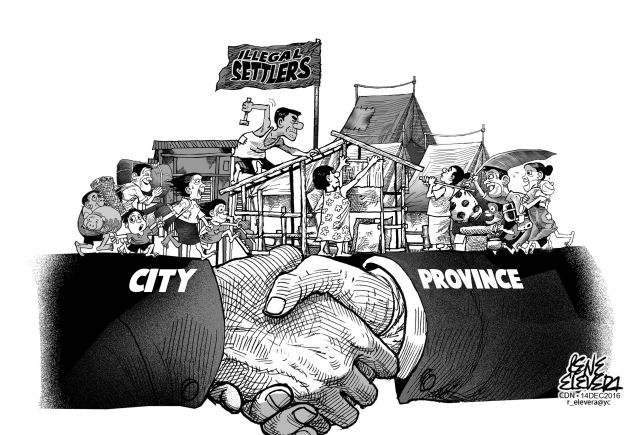With barely two weeks to go, the Cebu City Council may or may not approve the agreement signed by Mayor Tomas Osmeña and Cebu Gov. Hilario Davide III that would finalize a land swap deal for occupants of the province-owned lots covered by Ordinance 93-1 sometime in January next year.
They will certainly take their own sweet time doing so considering that they still have a budget to pass and the mayor is already having some issues over their cuts to his proposed budget.
But it’s the land swap deal that is at the spotlight for the moment and for good reason. There are at least 5,000 families that have occupied these lots for decades now, and while a lot of them have paid for the lots, the others have continued to stay with the belief that the province gave it to them for free.
It’s this mind-set — that anyone can just occupy any land he or she deems fit for his or her needs — that had led to overpopulation in many of the country’s urban centers, as the wealthy and the government bought up lands, forcing those who cannot afford to acquire their own to squat on these areas.
It was during the tenure of the Garcias that the province assessed the lots it owned and deemed it essential for the settlers to pay up. Owing to then vice mayor Michael Rama’s “dawat limpyo” remark, Mayor Osmeña’s initial foray into a land swap deal with former governor Gwendolyn Garcia fell apart, and both Garcia and Osmeña have become political enemies ever since.
But that’s the past, and the agreement signed between the city and the province could be seen as a bailout by the settlers and even those in the council who fear that they may be saddled with the problem of trying to collect the payments for the lots they have occupied for so long.
There was no mention about payment, which is what the council was looking for in trying to assess the agreement. Will the Team Rama bloc in the council question whether the city gave too much to the province in exchange for being saddled with the settlers who had defaulted, were delinquent in their payments or had refused to pay for the lots they occupied?
Supporters of the land swap deal say that the province doesn’t care so much about the payments so long as they get comparable real estate from the city to compensate for the losses incurred by the occupation of the settlers in the province-owned land.
They also argue that by rejecting the land swap deal, the Team Rama bloc will invite rejection from the 5,000 families whose votes will count in the 2019 midterm elections.
It’s up to the council to decide whether the land swap deal would be beneficial not just to the families living in these lots but to the city residents as well. If the deal pushes through, we hope it’s just a one-time thing, and it should not send the signal to other settlers to forcibly occupy privately and government-owned lands.
Disclaimer: The comments uploaded on this site do not necessarily represent or reflect the views of management and owner of Cebudailynews. We reserve the right to exclude comments that we deem to be inconsistent with our editorial standards.

